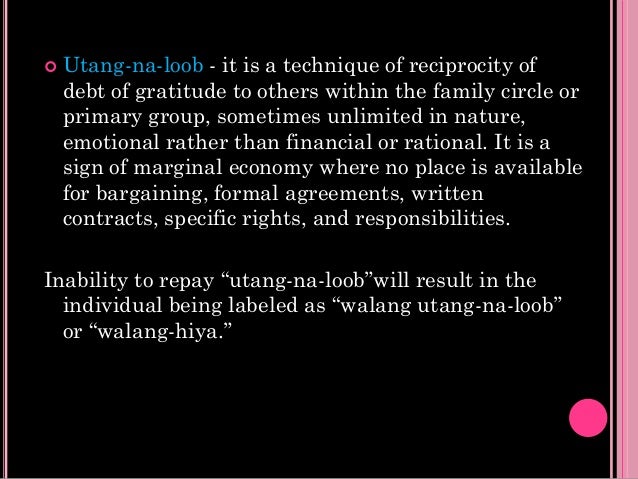Ang mga pabor na nakakalabas ng utang na loob. A person who is walang utang na loob is walang kuwentang tao One characteristic of true Utang na Loob is that it can never be fully repaid not by all.

Pdf The Filipino Character Strength Of Utang Na Loob Exploring Contextual Associations With Gratitude
3082010 Reciprocity and The Concept of Filipino Utang na Loob.

Utang na loob reciprocity. Morally it refers to debt of gratitude6 In the Filipino context it is associated with Filipinos character of being generous hospitable and their adherence to the belief of. 1642021 The Filipino value of Utang na Loob refers to an obligation to appropriately repay a person who has done one a favor. Why do I have to pay such a steep price for something I didnt asked for.
Kaunt translates utang na loob as the debt of prime obligations and behavioral and behavioral expectations which govern the lives of. This value is impossible to quantify as it involves a deep personal and internal dimension. The process begins with an unsolicited gift and.
Ang utang na loob. 652020 In our Filipino culture a child is born indebted to his parents for his life and is considered ungrateful walang utang na loob if he fails to take care of them in their old age 1. Sa isang tao ay yung mga pabor na hindi matutumbas ang halaga o kung may halagang nakasangkot may kasamang malalim na dimensyong personal na panloob.
Is a reciprocal form of attitude. We must be profuse in expressing our gratitude for all the favors or blessings we. The theme of reciprocity has received extensive attention in selected anthropological and other writings on Philippine society.
Utang na Loob literally means debt from the inside It is a sense of reciprocal social obligation. It results into more mutual benefits for the parties or persons involved. Rafael 1993 further explains that Utang na Loob is one of the key reasons on how Christianity spread throughout the Philippines.
18102020 One of the Filipino core values according to the work of Virgilio Enriquez 1992 is utang na loob. Upon the birth of a Filipino child he immediately and involuntarily enters into a relationship with his parents where he must likewise involuntarily reciprocate the love and sacrifices his parents gave him once he. 13102011 An Utang Na Loob.
Ive been asked a few times When does utang na loob ends. The essence of Utang Na Loob is an obligation to appropriately repay a person who has done one a favor. 2382017 Heres a decent explanation from Wikipedia.
Described the reciprocity of utang na loob as a form of obedience to the one granting favors requests or good deeds. The exchange of favor between two persons or between two units of society continue without letup. It is labeled as utang na loob reciprocity and is described as reciprocity where the recipient is obligated to show gratitude by intentionally repaying the favor so he does not remain indebted to the giver.
28102020 Utang Na Loob Reciprocity Obligation and responsibility are often viewed in terms of reciprocity utang na loob comprised of debts utang and inner-self-free will na-loob. Ay ang obligasyon na nararamdaman ng isang tao na muling bayaran ang isang taong gumawa ng pabor para sayo. A System of Contractual Obligation among.
Similarly studies o n gratitude also p resented the dynamics of reciprocity. The favors which elicit the Filipinos sense of Utang Na Loob are typically those whose value is impossible to quantify or if there is a quantifiable value involved involves a deeply personal internal dimension. Defined as debt of gratitude.
20122012 In the Philippines there is the concept of Utang na Loob which can be translated from the Tagalog as debt of inside or as debt of gratitude and is closely related to the reciprocity we were talking about in our last post. Because of the interdependent society of the Philippines interpersonal relations revolve to a large extent around the granting and receiving of favors. The most discussed from the reciprocity is utang na loob first explicated by kaunt 1961 is an anthropological study.
Reciprocity has developed in order to keep interpersonal relationships smooth. Utang na loob would be convenient in perpetuating the colonial status of the Filipino mind Enriquez 1977 especially since the English-language interpretations of utang na loob as reciprocity happen to be useful in promoting the image of the colonizer as the benefactor. Nito ay isinagawa ni Charles Kaut noong dekada 60 at ayon sa kanya utang na loob reflects a social system of sentiments of deep and strong affective nature and expressively symbolizes a whole configuration of reciprocal 2 Charles Kaut Utang Na Loob.
Andres and Ilada-Andres 1986 however consider utang na loob to be one of the three types of reciprocity that Filipinos exhibit. In Filipino Psychology value equates to the concept of kapwa a shared personhood or shared self. 1612010 Roughly translated as reciprocity or debt of gratitude Utang na Loob is a deeply rooted Filipino value.
To argue that utang na loob is solely a Filipino value is therefore misleading and dangerous. Utang na Loob as a Reciprocity carried in the womb for nine months and nourished and Even in history manifestations of Utang na Loob are present in terms of spreading Christianity in the Philippines.

The Two Faces Of Utang Na Loob My Blog
